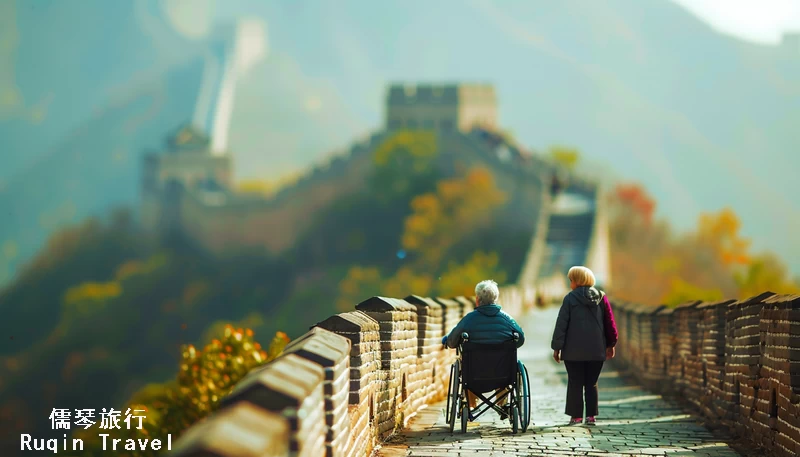Traveling in China can be an enriching experience, filled with unique cultural encounters and stunning landscapes. However, for foreign tourists with disabilities, especially wheelchair users, it requires careful planning and awareness of accessible options. This guide aims to provide comprehensive information to ensure a smooth and enjoyable journey for your accessible travel in China. From accessible hotels to transportation tips, we’ll cover everything you need to know about navigating China as a traveler with disabilities.
Accessible Travel in China: An Overview
China has made significant strides in improving accessibility for disabled travelers. However, there are still challenges. Major cities like Beijing, Shanghai, and Guangzhou offer more accessible facilities than rural areas.
Additionally, modern infrastructure, such as airports and train stations, usually provides amenities for disabled travelers. For instance, you’ll find ramps, elevators, and accessible restrooms in many public places. However, it’s essential to plan and research specific locations to avoid potential barriers.
Disabled-Friendly Destinations in China
When choosing destinations, it’s crucial to consider accessible travel in China. Beijing, Shanghai, and Xi’an are top choices due to their developed infrastructure. Beijing boasts wheelchair-friendly attractions like the Forbidden City and the Temple of Heaven.
The city’s public transportation system is also well-equipped with ramps and elevators. Shanghai offers accessible tourist spots like The Bund and Yu Garden. Moreover, the city’s modern metro system is generally wheelchair-friendly. Xi’an, famous for the Terracotta Warriors, has made efforts to improve accessibility at its historical sites.
China Accessibility for Wheelchair Users
Wheelchair users will find that accessibility varies widely across China. In major cities, public transport is more accommodating. For example, the Beijing Subway and Shanghai Metro offer designated spaces for wheelchairs.
However, not all stations have elevators or ramps, so it’s crucial to check in advance. Taxis are another option, with some companies offering accessible vehicles. When it comes to attractions, popular sites usually have ramps and accessible paths, but it’s advisable to contact the venue beforehand to confirm.
Accessible Hotels in China
Finding the right accommodation is key to a comfortable stay for your accessible travel in China. Most international hotel chains in China offer accessible rooms. These rooms typically feature wider doorways, roll-in showers, and grab bars.
For instance, hotels like the Hilton, Marriott, and InterContinental often have multiple accessible room options. Additionally, it’s advisable to book directly through the hotel’s website or contact them to ensure that the room meets your specific needs. Always confirm the availability of accessible facilities like elevators and ramps.
China Public Transport Accessibility
Public transport in China is continually improving in terms of accessibility. Major cities have invested in accessible buses and metro systems. For example, Beijing’s bus system includes buses with low floors and ramps.
The metro systems in cities like Shanghai and Guangzhou offer elevators and tactile paving for the visually impaired. However, smaller cities and rural areas may not have these amenities. Therefore, it’s essential to research and plan your transportation options in advance.
Wheelchair-Friendly Attractions in China
China offers a range of wheelchair-friendly attractions. In Beijing, Badaling and Mutianyu Great Wall sections have some accessible facilities for the disables. The Forbidden City has also made efforts to improve accessibility, with ramps and wheelchair rentals available.
In Shanghai, The Bund offers a scenic, accessible promenade. The Shanghai Tower and the Oriental Pearl TV Tower have elevators and accessible restrooms. In Xi’an, the Terracotta Warriors site is wheelchair-accessible, with ramps and designated viewing areas.
Disabled Traveler Tips China
When traveling in China, preparation is crucial. First, bring essential items like medications and mobility aids, as they may not be readily available in China. Additionally, consider hiring a local guide who understands the needs of disabled travelers.
This can make navigating the country easier and more enjoyable. Furthermore, learning a few basic Mandarin phrases can be helpful, especially when asking for directions or assistance. Lastly, always carry a written note in Chinese explaining your needs, which can be invaluable in emergencies.
Accessible Tourism China: A Growing Industry
Accessible tourism in China is growing, with more companies offering tailored tours for disabled travelers. These tours often include accessible transportation, accommodations, and guided visits to wheelchair-friendly attractions.
For example, some companies offer tours that focus on cultural experiences, such as traditional Chinese tea ceremonies or calligraphy workshops. Additionally, these tours can provide peace of mind, as the operators are experienced in accommodating the needs of disabled travelers.
Mobility Aids in China
For your accessible travel in China, it’s essential to bring your mobility aids. While major cities may have stores that sell or rent wheelchairs and other aids, the selection may be limited.
Additionally, it’s advisable to bring spare parts and tools, as finding replacements can be challenging. If you’re flying, check with your airline regarding their policies on mobility aids. Most airlines allow wheelchairs and other devices to be checked for free, but it’s crucial to confirm this in advance.
Accessible Transportation China
Transportation is a vital aspect of accessible travel. In addition to accessible buses and metros, China offers other transportation options. For example, high-speed trains in China usually have wheelchair-accessible cars.
These cars are equipped with wider aisles, accessible restrooms, and designated spaces for wheelchairs. However, booking these tickets can be challenging, as they are limited in number. It’s advisable to book well in advance and confirm your requirements with the train operator.
Traveling in China as a disabled tourist requires careful planning, but it can be a rewarding experience. The country offers a wealth of cultural and historical attractions, many of which are becoming increasingly accessible. By researching your destinations, booking accessible accommodations, and understanding the available transportation options, you can ensure a smooth and enjoyable trip. With the growing focus on accessible tourism, China is becoming a more inclusive destination for travelers with disabilities. So, pack your bags and get ready to explore the wonders of China with confidence and ease!



